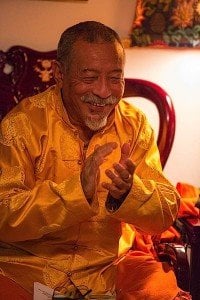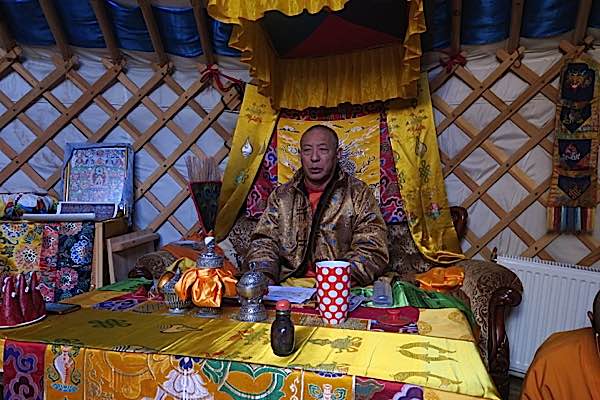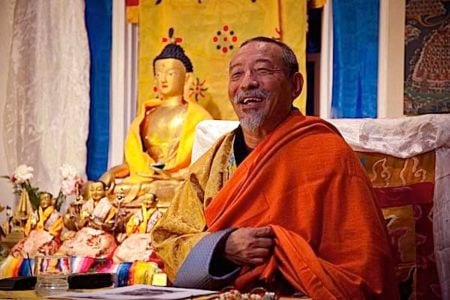Video Buddhist Advice 9: How Can Advanced Vajrayana Students Simplify and Manage Commitments and Practice? Answered by Venerable Zasep Tulku Rinpoche

In the ninth in a Buddhist practice video series, “Advice from the Teachers”, the Venerable Acharya Zasep Tulku Rinpoche, Spiritual Head of Gaden for the West Centers, answers a student’s question [play video below]:
What advice do you have for advanced students for their daily practice when they are too busy? Can you merge practices to simplify?
[Transcript below video]
Background: The student asking the question had received many initiations and commitments over the years and wanted to simplify, or even combine practices without giving up commitments or breaking vows. He also had several commitment practices with Guru Yoga, wanted to know how to simplify.
Rinpoche, in his answer emphasized the importance of commitment — “either do … or don’t do” that’s up to you — but if you do, he advised focusing intensely on the Yidam practice, while still undertaking other commitments in more concise form.
Play video here:
Transcript
Zasep Tulku Rinpoche: “Senior students should do daily practice. Do the minimum practice, if you are having some difficulties. At the same time, it is important to choose one practice as a main practice.

Let’s say you have your particular deity, what we call Yidam, or principal deity, a deity you feel very connected to. So, you choose one as a main Yidam. Do that practice, spend more time on that. Do that practice, sadhana, mantras. Then, other mantras, as a minimum commitment. I think that would be good.
You cannot do one mantra, trying to make it as a sort of substitute for all the other mantras [and practice commitments], thinking in your mind: ‘Well, all the Buddhas are One. A lot these Buddhas are emanations of Prajnaparamita, or, let’s say, Chenrezig, or Tara, so therefore why not just say one mantra to be substitute for other mantras.’

You can’t really do that because you don’t have permission. You know, we can think about things like that, trying to debate in our mind, or trying to justify. It doesn’t really work like that.
You either do the mantra properly — or don’t do. That’s how it works.”
Student asked a clarifying question: “What if you have a commitment to do several types of practice, like Six Session Guru Yoga, Vajrayogini Sadhana and Yamantaka Sadhana?”
“Six session guru yoga is a commitment after receiving initiation in a higher yoga tantra like Yamantaka, or let’s say Guhyasamaja. That is a commitment, one has to do. One must do that.
Then, there is a little bit of guru yoga practice in Chittimani Tara practice, long sadhana; there is a little bit of guru yoga practice in Vajrayogini, long Sadhana. I would say make those practices shorter. You can make it very concise. Short. [Except for your Yidam Practice. That, you keep long.]
You see, in the short sadhanas, there is almost none. Maybe there’s a few words, a few lines about Guru Yoga. Very concise. So you can make it that way. Make it very concise.
But — you can’t completely escape all those Guru Yogas. You can make it very short. Concise.”
Next: In Part 10 of this Series, students ask Rinpoche the question: “What advice do you have for students who have difficulties visualizing their Yidam to improve clarity and stabilization? How do you pick a personal Yidam for your practice?”
PREVIOUS BUDDHA WEEKLY ADVICE FROM THE TEACHERS VIDEOS:
Video 1: Advice for Students on Karma>>
Video 2: Advice for Students dealing with loss of a loved one>>
Video 3: Advice for Students coping with memory loss, Alzheimers or early dementia>>
Video 4: Advice for Students coping with the loss of a beloved pet>>
Video 6: Advice for the New Student to Buddhism>>
Video 7: Advice for Keeping Motivated in Your Daily Practice>>
Video 8: Purifying Negative Karma>>
Video 9: Advice for Advanced Vajrayana Students on Managing Commitments>>
About Venerable Zasep Tulku Rinpoche
 Rinpoche is popularly known for his approachable teaching style, strong humor and teachings based on a long lineage of great lamas. His own gurus included the most celebrated of Gelug teachers: His Holiness Kyabje Trijang Rinpoche, His Holiness Kyabje Ling Rinpoche, Venerable Geshe Thupten Wanggyel, His Holiness Kyabje Zong Rinpoche, Venerable Lati Rinpoche, Venerable Tara Tulku Rinpoche and Venerable Khalkha Jetsun Dampa Rinpoche.
Rinpoche is popularly known for his approachable teaching style, strong humor and teachings based on a long lineage of great lamas. His own gurus included the most celebrated of Gelug teachers: His Holiness Kyabje Trijang Rinpoche, His Holiness Kyabje Ling Rinpoche, Venerable Geshe Thupten Wanggyel, His Holiness Kyabje Zong Rinpoche, Venerable Lati Rinpoche, Venerable Tara Tulku Rinpoche and Venerable Khalkha Jetsun Dampa Rinpoche.
Rinpoche is spiritual director of many temples, meditation centres and retreat centres in Australia, the United States and Canada. He was first invited to teach in Australia by Lama Thubten Yeshe in 1976.
More on Zasep Tulku Rinpoche>>
Gaden for the West Meditation Centres
Australia
- Vajra Ling, Uralla, N.S.W.
- Losang Gyalwa Mandala, Sydney, N.S.W.
- Tenzing Ling Centre, Quamaa, N.S.W.
- Dorje Ling Retreat Centre, Lorina Valley, Tasmania
Canada
- Chittamani Mahayana Buddhist Meditation Centre, Ottawa, Ontario
- Gaden Choling, Toronto, Ontario
- Medicine Buddha Centre, Calgary, Alberta
- Potala Tibetan Buddhist Meditation Centre, Thunder Bay,Ontario
- Tashi Choling, Nelson, B. C.
- Zuru Ling Society, Vancouver, B.C.
United States
- Golden Blue Lotus Tara Meditation Center, Moscow, Idaho
- TsongKhapa Center, Kalamazoo, Michigan
- Vajrayogini Center, Seattle, Washington
More articles by this author
Search
Latest Features
Please support the "Spread the Dharma" mission as one of our heroic Dharma Supporting Members, or with a one-time donation.
Please Help Support the “Spread the Dharma” Mission!

Be a part of the noble mission as a supporting member or a patron, or a volunteer contributor of content.
The power of Dharma to help sentient beings, in part, lies in ensuring access to Buddha’s precious Dharma — the mission of Buddha Weekly. We can’t do it without you!
A non-profit association since 2007, Buddha Weekly published many feature articles, videos, and, podcasts. Please consider supporting the mission to preserve and “Spread the Dharma." Your support as either a patron or a supporting member helps defray the high costs of producing quality Dharma content. Thank you! Learn more here, or become one of our super karma heroes on Patreon.
Venerable Zasep Rinpoche
Author | Buddha Weekly
Rinpoche is spiritual head of many Dharma Centres, and teaches around the world. Originally from Kham province in Tibet (born 1948) Rinpoche has taught in the west since 1976, after he was first invited by Geshe Thubten Loden and Lama Yeshe to teach at the Chenrezig Institute in Australia. Today, he is spiritual head of the Gaden for the West centres in Canada, U.S., and Australia and also spiritual director of the the charities Gaden Relief Project (Canada) and Manlha Tus NGO (Mongolia). He is the author of three books, including his latest release in 2018 with a rare English commentary and practice instructions for Gelug Mahamudra.
















